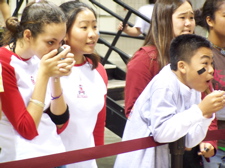Prerequisites:
The only prerequiste is an interest in learning about robotics and teamwork by doing service.
In particular, you must have an interest in helping middle and high school students
learn about robotics and teamwork.
Meeting times and places:
- Most weeks: Tuesday and Thursday, 9th and 10th periods, in D-219 (for lecture) and F-217 (CSSE lab, for project work)
- In addition, you will meet frequently with your Rose-Hulman teammates during scheduled class times or at other times that your team finds convenient.
- In addition, you will meet regularly (once or twice a week, most weeks) with the middle/high school students whom you mentor, at times
that you arrange with those students.
The mission of this course is to use service learning to help students internalize and deepen their understanding of how to work effectively in teams, while at the same time helping students improve their communication skills, their problem-solving, and their technical knowledge of robotics.
|
Learning Objectives (aka Course Outcomes)
Students who successfully complete the course should be able to demonstrate:
- An understanding of how to work effectively in teams, including (but not limited to):
- The importance of creativity and how to combat blocks to creativity.
- The importance of specifications and how to express them.
- The roles of team members and how to conduct effective team meetings using those roles.
- How to reach consensus and how to handle conflicts.
- How to manage the progress of the team using task lists and other techniques.
- How to develop alternative designs and choose among them.
- The goals of written, oral and interactive communication and how to
implement them effectively.
- An awareness of how professionalism impacts their career and how to maintain
professional standards in their work.
- An increased understanding of one or more technical subareas
of robotics, e.g. the design and use of sensors, software development of
concurrent code, path planning, vision, or programming language design.
- An ability to help others understand what engineering is and why it is fun.
- The ability to integrate the above mentioned course goals in the successful
completion of three course projects.
To accomplish these goals, students will complete 3 team projects:
- Project 1: Design, implement and deliver a robot demonstration
that might interest middle and high school students
in participating in the 2010 Botball competition
(www.botball.org).
- Project 2: Design and implement a
robot that could compete in the 2010 Beyond Botball
competition described at
www.botball.org/beyond_botball
- Students will build the robots using iRobot Create's, Legos, HandyBoard and Mindstorms controllers,
and many types of motors and sensors.
Some teams may use other, even more sophisticated, robotics parts.
- Project 3: Develop and deliver interactive
exercises that teach middle-school and high-school students
how to work effectively in teams.
- In doing so, students will internalize their own understanding of how to
work effectively in teams (per the goals listed above) and then deepen
that understanding by developing effective ways to communicate that
understanding to middle-school and high-school students.
- The best design for such exercises would allow the exercises to be extended
easily to other groups of people, e.g. first-year Rose-Hulman students.
- The exercises will be delivered to middle-school and high-school students
competing in the 2010 Botball competition described (in general terms) at
www.botball.org.
The Rose-Hulman students will deliver the exercises,
help teach the exercises to any middle-school and high-school teachers involved,
and mentor behavior implied by the
exercises in working with the middle-school and high-school students.
|


